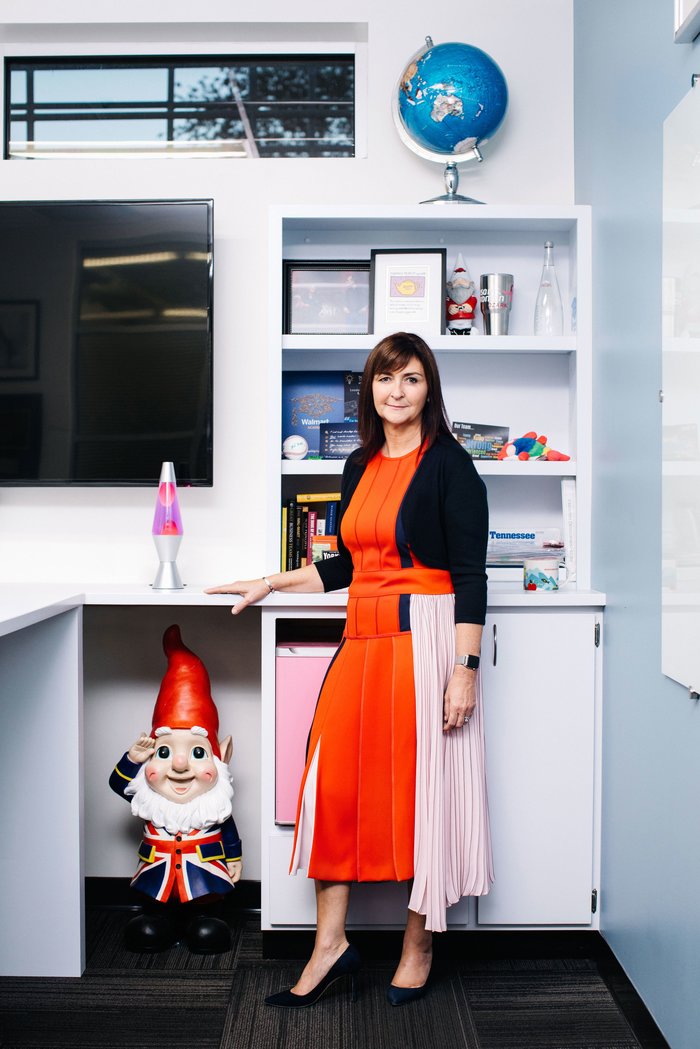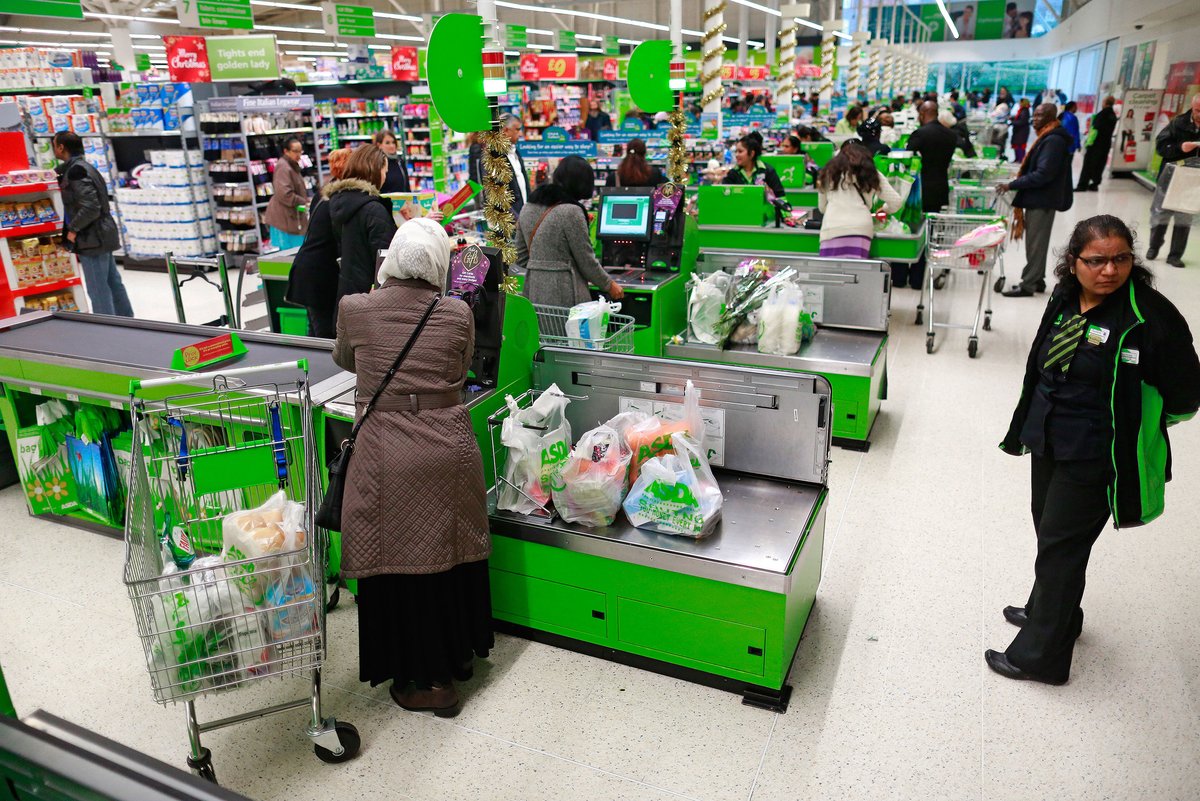她讓這家公司的國際業(yè)務(wù)規(guī)模超過了烏克蘭的GDP
|
沃爾瑪?shù)囊磺卸箭嫶蟮碾y以想象,包括其國際業(yè)務(wù)。 就銷售額而言,,沃爾瑪?shù)膰H業(yè)務(wù)超過了摩根大通,、波音和谷歌的母公司Alphabet。即便是可口可樂,、達(dá)美航空和Facebook加起來也難以望其項(xiàng)背,。這家零售巨頭的海外營收額超過了烏克蘭的GDP,以及美,、英之間全年的貿(mào)易額,。 然而可能最令人感到吃驚的一點(diǎn)在于:作為全球最大的業(yè)務(wù),擁有1180億美元營收的沃爾瑪國際業(yè)務(wù)似乎并未得到人們的重視,。 在1900名機(jī)構(gòu)投資者客戶中,向Bernstein的布蘭登·弗雷切深入了解有關(guān)沃爾瑪美國海外業(yè)務(wù)的投資者不超過五指之?dāng)?shù),。沃爾瑪?shù)膰H業(yè)務(wù)成為了大數(shù)定律的犧牲品,,而這是超大型公司獨(dú)有的問題,就像一條大魚一樣,,只是其生活的環(huán)境不是小池塘,,而是海洋。就沃爾瑪國際業(yè)務(wù)而言,,其對(duì)比對(duì)象便是沃爾瑪5000億美元的銷售額,。Telsey Advisory Group的喬·費(fèi)爾德曼說:“投資者只是選擇性地忽略了這項(xiàng)業(yè)務(wù)?!? 直到今年為止,。 自4月以來,沃爾瑪開展了一系列交易,,不僅實(shí)現(xiàn)了其國際業(yè)務(wù)的轉(zhuǎn)型,,同時(shí)還借此重新定義了公司在零售行業(yè)的地位。首先,,沃爾瑪同意將其英國業(yè)務(wù)Asda與J Sainsbury合并(沃爾瑪將持有合并后公司42%的權(quán)益),。然后,也就是出售Asda剛過一個(gè)月,,公司表示將向私募股權(quán)公司出售其巴西業(yè)務(wù)的大部分權(quán)益,。上述業(yè)務(wù)縮減舉措所涉及的市場(chǎng)在近20年來一直都是沃爾瑪全球版圖的一部分。 但與沃爾瑪在8月以160億美元購買印度最大在線零售商Flipkart 77%的股份相比較而言,,這一交易也就算不了什么了,。在零售營銷公司TCC Global的布萊恩·羅伯茨看來,沃爾瑪?shù)拇舜问召徔芍^是“貴到令人流淚”,。它是沃爾瑪歷史上最大的一筆投資,,也是純電商領(lǐng)域歷史上最大的投資。 |
EVERYTHING AT WALMART IS SUPERSIZED—including its international business. Walmart International is bigger by sales than JPMorgan Chase, Boeing, and Google’s parent company, Alphabet. Even Coca-Cola, Delta Air Lines, and Facebook combined can’t touch its scale. The retailer’s dealings abroad generate more revenue than the GDP of Ukraine and surpass the value of all trade conducted between the U.S. and U.K. in a year. But here, perhaps, is the most surprising stat of the bunch: Walmart’s $118-billion-in-revenue international operation is the biggest business in the world that no one seems to pay very much attention to at all. Among his 1,900 institutional investor clients, Bernstein’s Brandon Fletcher can count on one hand the number of in-depth conversations he’s had about the company’s footprint outside the U.S. The business is a victim of the law of large numbers, the kind of problem unique to a very big fish that lives not in a small pond but a vast ocean—in this case swimming amid the retailer’s gargantuan half-a-trillion dollars in sales. “Investors just kind of overlooked it,” says Telsey Advisory Group analyst Joe Feldman. Until this year, that is. Since April, Walmart has undertaken a flurry of deals that are not only transforming the face of its international business, but are, by extension, also rewriting the company’s place in the retail landscape. First Walmart agreed to merge its U.K. business Asda with J Sainsbury (it will hold 42% of the combined entity). Then, just over a month later, it said it would off-load the majority of its Brazilian operation to a private equity firm. The moves are a retrenchment in markets that were part of Walmart’s global footprint for some two decades. But those deals look small in comparison to the $16 billion Walmart spent in August for an approximately 77% stake in Flipkart, India’s biggest online retailer. The investment, which Bryan Roberts of retail marketing firm TCC Global calls “eye wateringly expensive,” is the biggest in Walmart’s history and the largest ever in the pure e-commerce sector (just in case there weren’t enough superlatives in the mix already). |

|
沃爾瑪一直希望,、努力并成功地發(fā)展成為了全球最大的零售商,,乃至這個(gè)時(shí)代地球上最大的公司。它通過專注于提升其銷售額實(shí)現(xiàn)了這一目標(biāo),。隨后,,在短短數(shù)周的時(shí)間內(nèi),公司似乎拋棄了創(chuàng)始人山姆·沃爾頓傳承下來的銷售額至上理念,,轉(zhuǎn)而出售了英國相當(dāng)穩(wěn)定的盈利業(yè)務(wù),,并收購了印度一家處于虧損中的企業(yè),而且這家印度公司可能要等到10年之后才會(huì)出現(xiàn)創(chuàng)收的跡象,。 零售咨詢公司McMillanDoolittle的尼爾·斯特恩說:“這是一系列令人大跌眼鏡的舉措,。看來沃爾瑪十分愿意做出這一豪賭,,并對(duì)零售業(yè)有了新的認(rèn)識(shí),。” 來自于英國的朱迪斯·麥肯納自2月開始執(zhí)掌沃爾瑪國際業(yè)務(wù),,在6月的一次投資者會(huì)議上,,她以略微傾向于經(jīng)典的英式低調(diào)口吻說:“毫無疑問,過去四個(gè)月我們十分繁忙,?!钡裣耐硇r(shí)候在阿肯色州本頓維爾的沃爾瑪總部承認(rèn):“我并不一定贊成以這種方式來開始自己的新工作?!? 確實(shí),,麥肯納和她的團(tuán)隊(duì)擔(dān)負(fù)著巨大的責(zé)任,也需要承擔(dān)巨大的后果,。就重整公司全球版圖而言,,他們實(shí)際上正在押注零售業(yè)的未來。麥肯納說:“在一些市場(chǎng),,我們不再建實(shí)體店,,這沒什么可遮掩的?!睂?duì)于一家在美國依靠其倉儲(chǔ)式零售來創(chuàng)收的企業(yè)來說,,該聲明頗為令人側(cè)目。沃爾瑪開始在電商領(lǐng)域布局其資本,,這一舉措主要源于公司與亞馬遜的現(xiàn)有競(jìng)爭(zhēng),。在美國,沃爾瑪以33億美元收購了在線零售商Jet.com,,彰顯了其對(duì)待這場(chǎng)戰(zhàn)爭(zhēng)的認(rèn)真態(tài)度,。如今,沃爾瑪正準(zhǔn)備通過收購Flipkart、注資中國京東和達(dá)達(dá)-京東到家,、結(jié)盟日本樂天以及收購墨西哥和智利的在線市場(chǎng)Corner-shop,,在全球范圍內(nèi)開戰(zhàn)。 這一舉措與沃爾瑪以往的策略相比可謂是迥然不同,。過去,,沃爾瑪通過進(jìn)駐國家數(shù)來衡量自身的成功。前沃爾瑪國際首席營銷官里克·本德爾解釋道,,沃爾頓的文化建立在特大購物中心實(shí)體店模式之上,,但“它并非是構(gòu)建沃爾瑪未來業(yè)務(wù)的金科玉律?!比缃?,將這家剛好擁有國際業(yè)務(wù)的美國零售商轉(zhuǎn)型為一家真正的國際化企業(yè)的重?fù)?dān),落在了麥肯納的肩上,。 對(duì)沃爾瑪?shù)膰H業(yè)務(wù)舉措的評(píng)價(jià)有點(diǎn)類似于觀看爛番茄網(wǎng)站B級(jí)動(dòng)作片(預(yù)算低,、拍攝時(shí)間短的影片——譯者注)的頁面:“眾說紛紜”,Edward Jones的分析師布萊恩·雅布羅說道,。哈佛商學(xué)院教授拉吉夫·拉爾將其稱為“喜憂參半”,而行業(yè)咨詢師克萊格·約翰遜給出了“飄忽不定”的評(píng)價(jià),,Wolfe Research的斯考特·穆錫金則十分直截了當(dāng):“這就是個(gè)昏招,。” 這一點(diǎn)明顯說明沃爾瑪?shù)臄U(kuò)張舉措受到了諸多的挑戰(zhàn),,盡管不怎么受重視,,但沃爾瑪?shù)膰H業(yè)務(wù)業(yè)績(jī)可能是行業(yè)中最接近美國成功故事的范例。咨詢公司AlixPartners的馬特·哈莫里說:“即便是沃爾瑪遭遇困難的時(shí)候,,它仍比當(dāng)代任何美國零售商都做的更出色,。” 這也就是說,,在美國海外進(jìn)行擴(kuò)張——一個(gè)帶有尊嚴(yán)、民族主義和文化沖擊這類潛臺(tái)詞的過程——是異常艱難的。咨詢公司Brick Meets Click的比爾·畢夏普解釋說:“由于這些公司在某一個(gè)文化中已經(jīng)大獲成功,,因此它們很難相信自己會(huì)在另一個(gè)文化中遭遇滑鐵盧,。”一些高管基本上難以理解這樣一個(gè)事實(shí):對(duì)于他們本土市場(chǎng)之外的消費(fèi)者,,他的公司通常僅僅被看作是新成立的,、銷售別人產(chǎn)品的大賣場(chǎng)。 對(duì)于大多數(shù)公司來說,,業(yè)務(wù)增長(zhǎng)的誘惑是難以抵御的,。沃爾瑪在20世紀(jì)90年代初期便在認(rèn)真考慮在全球擴(kuò)張的可能性,當(dāng)時(shí)華爾街開始質(zhì)疑公司能否保持其兩位數(shù)的營收增速。管理層制定了一項(xiàng)決策,,認(rèn)為其三分之一的新增長(zhǎng)應(yīng)來自于海外,。 沃爾瑪在美國之外的第一家店是1991年在墨西哥城開設(shè)的山姆店。自此之后墨西哥業(yè)務(wù)一直穩(wěn)步發(fā)展,,成為了公司最成功的國際市場(chǎng),,緊隨其后的是加拿大,沃爾瑪于1994年收購了加拿大一家步履維艱的連鎖店,,然后扭虧為盈,。 然而,就在公司為了實(shí)現(xiàn)其激進(jìn)的目標(biāo)而收購更多的公司時(shí),,批評(píng)聲接踵而至,。 雅布羅說:“這是為了增長(zhǎng)而增長(zhǎng)?!睂?duì)于一些人來說,,這些收購更像是賭博,而不是深思熟慮后的決定,。前沃爾瑪高管本德爾說:“說的夸張點(diǎn),,除了在新市場(chǎng)收購公司之外,沃爾瑪基本上沒有什么國際策略可言,?!? 然后是德國。TCC Global的羅伯茨說:“德國給了沃爾瑪非常深刻的教訓(xùn),?!痹?998年進(jìn)入德國市場(chǎng)之后,沃爾瑪堅(jiān)持向消費(fèi)者銷售帶包裝的商品,,這在德國來說象征著高端購物體驗(yàn),,因此破壞了沃爾瑪?shù)膬r(jià)值主張。沃爾瑪要求收銀員對(duì)客戶微笑,,這在德國社會(huì)來說是難以接受的,,同時(shí),沃爾瑪?shù)拿衷诘抡Z中的發(fā)音十分拗口,。沃爾瑪與當(dāng)?shù)毓?huì)發(fā)生了沖突,,而且沃爾瑪基本上也不具備足夠的吸引力,讓購物者放棄他們已經(jīng)熟悉而且十分喜歡的折扣店,。公司在2006年撤出了德國市場(chǎng),。 本德爾說:“我覺得沃爾瑪從中吸取了深刻的教訓(xùn),事后,,公司變得異常謹(jǐn)慎,,不去做過多的干預(yù),。”公司在使用沃爾瑪名稱時(shí)也會(huì)慎重考慮,,例如,,在日本使用Seiyu這一名稱,并在智利使用Lider作為旗下的一個(gè)品牌,??紤]到星巴克和7-11便利店在全球普天蓋地的同名店面,這一舉措并不多見,。 然而多年來,,這家總部位于本頓維爾的公司并未能完全放開其拳頭。麥肯納說:“我們?cè)矚g完全掌控,,成為店面的所有者,。”然而隨著電子商務(wù)成為了全球的一股新興力量,,在這一領(lǐng)域缺乏經(jīng)驗(yàn)的沃爾瑪開始重新思考其策略,。巨大的新興市場(chǎng)有著十足的誘惑力,而且能夠?yàn)槟切┙?jīng)驗(yàn)豐富,、能夠通過選擇正確的合作伙伴進(jìn)駐這一市場(chǎng)的公司提供豐厚的利潤,。同時(shí),沃爾瑪也意識(shí)到,,公司不能再采取事必躬親的做法,。如今,借助公司在全球各大企業(yè)的投資與股份,,沃爾瑪在很多地方開始以投資者的身份出現(xiàn),而不是零售商,。國際業(yè)務(wù)首席財(cái)務(wù)官理查德·梅菲爾德表示:“我覺得在今后,,我們無需再去做日常性的決策?!彼f,,合作模式“并非是公司的傳統(tǒng)運(yùn)營模式,但我們正在學(xué)習(xí),?!? 麥肯納所處的獨(dú)特位置,讓其對(duì)沃爾瑪收購交易的利弊了如指掌,。她曾是英國百貨店Asda的財(cái)務(wù)主管,,沃爾瑪于1999年以108億美元將其收入麾下,是Flipkart之前沃爾瑪最大的收購交易,。 她在Asda的晉升速度十分快,,先是首席財(cái)務(wù)官,,然后首席運(yùn)營官,這一現(xiàn)象引起了其母公司沃爾瑪?shù)淖⒁?,但面?duì)那些有關(guān)她是否愿意承擔(dān)更廣泛職務(wù)的問題時(shí),,麥肯納最初給出了否定答案。 她說:“我真的不想再做其他的工作,。我覺得我自己已經(jīng)有了這個(gè)世界上最好的工作,,我在得到這份工作之前突破了重重阻礙,而且對(duì)這份工作感到很滿意,,謝謝,。”在最近談到有關(guān)自己在公司總部的職業(yè)發(fā)展時(shí),,她將自己的這一傾向描述為不愿意把頭伸出“護(hù)墻”外,。房間里的聽眾不知道“護(hù)墻”是什么意思,一臉茫然地看著她,。她只好解釋說:“那是是城堡上的矮墻,,如果把頭伸到矮墻外,你有可能中彈,?!? 當(dāng)Asda的首席執(zhí)行官于2010年離開后,英國媒體一直認(rèn)為麥肯納是公司可能的接班人,,而且英國媒體對(duì)此事的報(bào)道力度不亞于大多數(shù)小報(bào)對(duì)明星分手新聞的關(guān)注,。麥肯納稱,她覺得自己缺乏相關(guān)的管理經(jīng)驗(yàn),,因此沒有什么勝算,。 |
Walmart has aspired and toiled—and succeeded—in its quest to become not just the biggest retailer in the world but the biggest company on the planet, period, and has done so by obsessing over how to grow its top line. Then, in a span of just a few weeks, it seemed to throw the scripture handed down by founder Sam Walton out the window, by essentially trading a reasonably stable, profitable business in the U.K. for a money-losing venture in India that may take a decade to even begin to show signs of paying off. “It’s a series of jaw-dropping moves,” says Neil Stern of retail consultancy McMillanDoolittle. “There’s a willingness to make these huge bets and to think about retail differently.” Judith McKenna, a Brit who has headed up the international business since February, tends to lean a bit more toward classic English understatement: “It’s certainly been a busy four months,” she said at an investor meeting in June—although later this summer at Walmart headquarters in Bentonville, Ark., she admits, “I’m not necessarily recommending it as a way to come into a job.” Indeed, McKenna and her team bear a Walmart-size responsibility with Walmart-size consequences. In reprioritizing the company’s global footprint, they are effectively placing bets on the future of retail. “We’ve made no secret that in certain markets we’ll do no more bricks and mortar,” McKenna says—a striking admission from a company that built its U.S. fortunes on the back of big-box retailing. Instead, Walmart is redeploying its capital in the e-commerce sphere, a move driven in large part by its existential battle with Amazon. In the U.S., Walmart got serious about that fight in 2016 with its $3.3 billion acquisition of online retailer Jet.com. Now it is preparing to duke it out across the globe with its Flipkart deal, investments in JD.com and Dada-JD Daojia in China, alliance with Rakuten in Japan, and acquisition of online marketplace Corner-shop in Mexico and Chile. The approach looks very different from the Walmart of the past, which was prone to measure success by how many countries it had crossed off its list. The culture of Walton stood for the supercenter store model, explains Rick Bendel, Walmart’s onetime international chief marketing officer, but “that isn’t the credential one needs to build the next phase of Walmart.” Now it’s McKenna’s job to transform the retailer from an American company that happens to have an international business into a truly global enterprise.?? THE REVIEWS of Walmart’s international achievements read a bit like the Rotten Tomatoes page of a B action movie: “Very spotty,” says Edward Jones analyst Brian Yarbrough. Harvard Business School professor Rajiv Lal calls it “a mixed picture,” while industry consultant Craig Johnson weighs in with “checkered.” And bluntly from Wolfe Research’s Scott Mushkin: “It’s just not good.” It says a lot then about the challenges of expansion that despite the tepid ratings, Walmart’s international performance is probably the closest thing the industry has to an American success story. “Even in the struggles they’ve had, they’re still doing better than any U.S. retailer has done in the modern era,” says Matt Hamory of consulting firm AlixPartners. Which all goes to say that expanding beyond borders—a process tinged with the subtext of ego, nationalism, and culture clash—is colossally hard. “Because companies have been so successful in one culture,” explains Bill Bishop of consultancy Brick Meets Click, “it’s impossible for them to believe that they’re not going to be successful in another.” Some executives simply cannot process the fact that to consumers beyond their home market, they are often viewed as just another big box selling someone else’s products. The allure of growth, though, has been too tempting for most companies to ignore. Walmart got serious about the potential for global expansion in the early 1990s when Wall Street started to question whether it could continue its double-digit percentage revenue increases. Management landed on a strategy that dictated that a third of new growth would come from abroad. Walmart’s first store outside the U.S. was a Sam’s Club that opened in Mexico City in 1991. Mexico would go on to become the company’s most successful international market, followed by Canada, where it bought a struggling chain of stores in 1994 and turned it around. But as the company pursued more acquisitions to hit its aggressive targets, criticism followed. “It was growth for growth’s sake,” says Yarbrough. To some, the deals seemed more opportunistic than deliberate. Says former Walmart executive Bendel, “It’s a little bit of an overstatement to say they had an international strategy—other than acquiring businesses in new markets.” Then came Germany. “They learned a horribly brutal lesson there,” says Roberts of TCC Global. After entering the market in 1998, Walmart insisted on bagging groceries for customers, which in Germany signaled a higher-end shopping experience and eroded Walmart’s value proposition. Clerks were required to smile at customers—not socially acceptable in the country—and Germans even had trouble pronouncing the company’s name. Walmart clashed with local unions and just generally struggled to give shoppers a reason to switch from the discounters they already knew and liked. Walmart pulled out of the country in 2006. “I think there was a sense of big lessons learned,” says Bendel, “and the consequence was being extremely careful not to interfere too much.” The company has become more thoughtful about when to deploy the Walmart name, operating as Seiyu in Japan, for example, and using Lider as one of its brands in Chile—an unusual move given the number of Starbucks and 7-Elevens blanketing the globe. Yet for years, Bentonville couldn’t bring itself to truly release its grip. “We liked complete control,” explains McKenna. “We liked ownership.” But as e-commerce—an area in which Walmart lacked expertise—became a growing force globally, the company began to reconsider. Add the lure of massive emerging markets, which promise untold profits to those savvy enough to approach them with the right partners, and the retailer came to the realization that it could no longer do everything itself. Now with its various stakes and holdings around the globe, in a lot of places Walmart is starting to look more like an investor than a retailer. “I think we’ll get to a place where we aren’t making all the day-to-day decisions,” says Richard Mayfield, CFO of the international division. Partnerships, he says, “are not something that’s in our DNA—we’re learning.” MCKENNA IS IN the unique position of knowing what it’s like to be on both sides of a Walmart acquisition. She was working as the financial controller for British grocer Asda when in 1999 Walmart acquired it for $10.8 billion—the company’s biggest deal ever until Flipkart. Her rapid progress up Asda’s ranks, to CFO and then COO, drew the attention of the grocer’s parent, but McKenna initially brushed off questions about whether she’d be game for a broader role. “I didn’t really want to do anything else,” she says. “I thought I had the best job in the universe, and I had broken every ceiling going, and I was quite happy with it, thank you.” During a recent talk about career development at company headquarters, she described the inclination as an unwillingness to put your head above the parapet—that’s the “castle bit on a castle,” she clarified for the blank stares in the room. If you put your head above it, she explained matter-of-factly, you’re likely to get shot. When Asda’s CEO left in 2010, McKenna kept coming up as a possible successor in the British press, which covered the U.K. grocery sector with the same breathlessness most tabloids reserve for celebrity breakups. McKenna says she didn’t feel like she had the operations experience and took herself out of the running. |

|
這件事情發(fā)生后,,她也在思考可能自已也該向圍墻外看看了,。2010年,她開始嘗試經(jīng)營一家新成立的小分店,,隨后,,她便收到了沃爾瑪總部拋出的橄欖枝——一個(gè)負(fù)責(zé)業(yè)務(wù)策略與發(fā)展的職務(wù),她接受了,。 上任數(shù)年之后,,她發(fā)現(xiàn)自己陷入了危機(jī)。沃爾瑪美國的同店銷售額(一項(xiàng)重要的行業(yè)指標(biāo))連續(xù)5個(gè)季度出現(xiàn)下滑,。沃爾瑪美國業(yè)務(wù)總裁兼首席執(zhí)行官克萊格·佛朗任命麥肯納擔(dān)任運(yùn)營負(fù)責(zé)人,,幫助解決這個(gè)問題。他覺得她是策略師,、運(yùn)營者和文化代言人的合體,,同時(shí)還擁有他所謂的“超乎尋常的精力”,。 在她的首次市場(chǎng)經(jīng)理會(huì)議中,麥肯納面對(duì)的是“如潮水般”,、全盤否定店面各種做法的反饋,。“那天晚上我回到家之后對(duì)我丈夫說:‘我真不知道從何入手,,而且實(shí)際上也不知道是否能夠勝任這份工作,。’”(丈夫?qū)λf要戰(zhàn)勝自己,,并“繼續(xù)干下去”——這句話后來成為了麥肯納的口頭禪),。麥肯納開始在全國各地旅行,與店面經(jīng)理會(huì)面,,最終跑遍了美國各州,。在會(huì)議室中,她會(huì)坐在前面,,專注地傾聽這些意見,。她說:“人們希望有一個(gè)傾訴的對(duì)象。你知道嗎,,他們會(huì)告訴你結(jié)癥在哪,,而且他們通常也會(huì)告訴你解決之道?!? 這些經(jīng)理對(duì)她說,,庫存太多,員工沒有動(dòng)力,,店面缺乏麥肯納所謂的TNT(那些值得注意的小物件),,例如清掃地面的設(shè)備:“我站在講臺(tái)上說:‘我宣布,店面將再次啟用掃地機(jī),?!_(tái)下一片歡呼?!彼艑捔藢?duì)著裝的要求,并重新組建了沃爾瑪無線電廣播,,店面員工再也不用一遍又一遍地循環(huán)播放席琳·迪翁和賈斯丁·比伯的歌曲,。 然而,她的一些動(dòng)議并非是小打小鬧,。佛朗說:“有著麥肯納財(cái)務(wù)背景的人通常會(huì)嘗試四平八穩(wěn)的解決方式,,他們想到的是‘如何裁員’而不是如何提升銷售額?!丙溈霞{和佛朗反其道而行之,,耗費(fèi)了20億美元用于增加店面雇員的薪資和培訓(xùn),,并提升他們的技能,這樣,,他們便可以在店面花更多的時(shí)間與顧客相處,。 在幫助重振美國業(yè)務(wù)的過程中,麥肯納所采用的很多工具都來自于Asda,。這家公司曾經(jīng)是公司的創(chuàng)新熱土(如果百貨行業(yè)存在創(chuàng)新一說的話),。例如“點(diǎn)擊提貨”(在線下單然后在店拿貨的做法)。如今,,起源于英國的這一做法已成為沃爾瑪美國電商業(yè)務(wù)的基石,。她說:“我深知,作為一家公司,,分享最佳實(shí)踐和人才的能力會(huì)帶來巨大的收益,。”但是麥肯納知道,,業(yè)務(wù)的重心正在轉(zhuǎn)移,,而且在未來自己會(huì)進(jìn)一步向東擴(kuò)張。 事實(shí)上,,她于今年春天乘坐飛機(jī)回訪了Asda位于利茲的總部,,舉行了市民大會(huì),因?yàn)楣蛦T得知Asda將與另一家公司合并,。沃爾瑪預(yù)計(jì)在該交易中不會(huì)出現(xiàn)現(xiàn)金損失,,而且會(huì)在與J Sainsbury合并成立的新公司中持少數(shù)股份。盡管麥肯納對(duì)于合并感到十分難過,,因?yàn)樽约核械牧闶蹖iL(zhǎng)都源于她在Asda的那段時(shí)光,,但是她說:“這是必須付出的代價(jià)?!? 這一決心在5月9日派上了用場(chǎng),,當(dāng)時(shí),沃爾瑪宣布收購印度電商巨頭Flipkart 77%的股權(quán),。當(dāng)外界得知沃爾瑪為此交易斥資160億美元時(shí),,沃爾瑪股價(jià)下跌了3%。這一價(jià)格已經(jīng)接近沃爾瑪一年的現(xiàn)金流,。此舉預(yù)計(jì)將為沃爾瑪下一個(gè)財(cái)年的每股收益帶來60美分的負(fù)面影響,。 在那天打入電話的分析師當(dāng)中,麥肯納,、首席執(zhí)行官道格·麥克米倫和首席財(cái)務(wù)官布雷特·比格斯僅收到了一個(gè)討論會(huì)常見的敷衍式“祝賀”,,但質(zhì)疑聲卻是此起彼伏。 沃爾瑪打算如何幫助Flipkart遏制運(yùn)營虧損,?什么時(shí)候才能達(dá)到收支平衡,?為什么不把這筆錢花在美國而是充滿不確定因素的印度,,尤其是在沃爾瑪國際業(yè)務(wù)可查記錄乏善可陳的時(shí)候? |
But the episode got her thinking that maybe it was time to peek over the parapet after all. In 2010, she put her hand up to run a newlyformed small stores division, and the next time she was approached about a move to Bentonville—and a strategy and development role—she went for it. A few years in, she found herself in the middle of a crisis. Walmart U.S.’s same-store sales, a critical industry metric, had fallen for five quarters in a row. Greg Foran, president and CEO of Walmart U.S., brought McKenna on as his operations chief to help fix the business. He thought she had the right combination of strategist, operator, and cultural ambassador—as well as what he calls “an amazing engine.” At her first market manager meeting, McKenna faced a “tidal wave” of feedback about everything that was wrong in the stores. “I went home that night and said to my husband, ‘I absolutely have no idea where to start here, and actually I don’t know if I can do it.’ ” (He told her to get over herself and “get on with it”—a phrase McKenna also employs with regularity.) McKenna started to fly around the country to meet with store managers, eventually visiting every state. She would sit in the front of the room and just hear them out. “People like to be listened to,” she says. “And you know what, they tell you what the problem is—and they usually tell you what the answer is.” They told her was there was too much inventory. That associates weren’t motivated. That they lacked what McKenna calls TNTs—tiny noticeable things—like equipment to clean the floors: “I stood on a stage and said, ‘I’d like to announce we’re bringing back propane buffers.’ The place went nuts.” She relaxed the dress code and reinstituted Walmart Radio, relieving store employees of a heavy rotation of Celine Dion and Justin Bieber CDs. Some of her initiatives, however, were not so tiny. Someone with McKenna’s finance background will often try to “save their way out of a problem,” says Foran. “It’s ‘How do I cut?’ as opposed to growing the top line.” Instead, McKenna and Foran spearheaded a more than $2 billion investment in increased wages, training, and technology for store employees so they could spend more time out on the floor with customers. A good number of the tools McKenna employed to help turn around the U.S. business originated at Asda, which was once a hotbed of innovation for the company—if there is such a thing in the grocery industry. Take click-and-collect, the process of ordering online and picking up at the store. Now the bedrock of Walmart’s U.S. e commerce strategy, it started out in the U.K. “I wouldn’t underestimate the benefit we’ve had as a company from the ability to share best practices and talents,” she says. But McKenna knows that the center of gravity is shifting, and going forward she’ll be looking further east instead. In fact, this spring she got on a plane and returned to Asda’s headquarters in Leeds to hold a town hall after employees learned that the company was being merged. Walmart, which expects a non-cash loss on the deal, would take a minority stake in the newly combined entity with J Sainsbury. It was hard emotionally for McKenna, who had learned everything she knows about retail from her time at Asda. But, she says, “that’s what it’s going to take.” THAT KIND OF resolve came in handy on May 9, when Walmart announced its 77% stake in Indian e-commerce giant Flipkart. The stock tumbled 3% on the news that the company had sunk $16 billion into the deal—not that far off from a year’s worth of free cash flow. The move is expected to drag down earnings per share by 60¢ in its next fiscal year. Dialing in for an analyst call that day, McKenna, CEO Doug McMillon, and CFO Brett Biggs received only one of the perfunctory “congrats” typical of the forum and instead faced a wave of skepticism. How did Walmart plan to stem Flipkart’s operating losses? When would it break even? Why not deploy that capital in the U.S. rather than in India, a wild-card market—especially when Walmart’s international track record was not so hot? |

|
印度的零售市場(chǎng)正在向萬億美元大關(guān)邁進(jìn),但電商份額僅占2%,。紐約大學(xué)斯騰商學(xué)院的營銷學(xué)教授斯科特·嘉樂威表示:“價(jià)格太高了,,他們當(dāng)時(shí)收購Jet也是如此。但如果他們可以借此將公司發(fā)展成為全球增速最快市場(chǎng)的領(lǐng)軍電商企業(yè),,這個(gè)價(jià)格可能還是值得的,。”亞馬遜在沃爾瑪?shù)难燮さ紫掳l(fā)展壯大,,阿里巴巴在中國亦是如此,,而沃爾瑪如今正在迎頭趕上。160億美元可能僅僅只是進(jìn)駐全球人口第二大國的門檻費(fèi),。 這可能也是無法找到完美解決之道的代價(jià),。隨著數(shù)字與實(shí)體世界的交匯,沃爾瑪也逐漸愿意承認(rèn)自己無法找到完美的解決之道,。麥肯納常說的一個(gè)職業(yè)建議是:讓你勝任當(dāng)前工作的技能并不一定就能讓你在未來的工作中獲得成功,。她似乎意識(shí)到這一點(diǎn)同樣適用于沃爾瑪。公司在倉儲(chǔ)式零售方面所積累的專長(zhǎng)可能并不能用于在全渠道的未來與亞馬遜和阿里巴巴進(jìn)行競(jìng)爭(zhēng),。麥肯納說:“沃爾瑪在本質(zhì)上并非是一家科技公司,。其他公司在這一方面比我們要強(qiáng)很多?!盕lipkart是其中之一,,而且作為一個(gè)愿意問問題而不是下命令的高管,麥肯納打算將其在印度學(xué)到的東西帶到其他市場(chǎng)——就像她把英國的最佳實(shí)踐帶到美國那樣,。 在麥肯納擔(dān)任Asda首席財(cái)務(wù)官時(shí),,同事們都會(huì)因?yàn)樗?guī)避風(fēng)險(xiǎn)的愛好而跟她開玩笑。她笑著說:“我以前會(huì)在工作介紹中提到這一點(diǎn),?!彼坏貌粚W(xué)著去慢慢適應(yīng)去冒風(fēng)險(xiǎn)?!拔艺J(rèn)為這對(duì)沃爾瑪來說是一個(gè)重要的轉(zhuǎn)變,,對(duì)于我這樣的個(gè)人也是如此?!睂?duì)于麥肯納和沃爾瑪,最大的風(fēng)險(xiǎn)可能在于永遠(yuǎn)追求四平八穩(wěn),。(財(cái)富中文網(wǎng)) 本文的另一個(gè)版本作為《最具影響力的商界女性》的組文,,刊登于2018年10月1日刊的《財(cái)富》雜志,,標(biāo)題為《沃爾瑪眼中的世界》 譯者:馮豐 審校:夏林 ? |
India’s retail market is on its way to $1 trillion, but e-commerce represents only 2% of the overall pie. “They overpaid, just as they overpaid for Jet,” says Scott Galloway, a professor of marketing at NYU Stern School of Business. “But if they can establish themselves as a leader in e-commerce in one of the fastest-growing markets in the world, it may be worth it.” Amazon had developed right under Walmart’s nose in the U.S., just as Alibaba did in China, where Walmart is now trying to play catch-up. The $16 billion may simply have been the price of admission to play in the globe’s second-most-populated country. It’s also the cost of not having all the answers—something that Walmart has been increasingly willing to admit to as the digital and physical worlds collide. McKenna likes to give the career advice that the skills that got you to your current job are not necessarily the ones that will make you successful in your next role. She seems to realize the same is true of Walmart. The expertise the company built in big-box retailing may not be what it needs to battle Amazon and Alibaba in an omnichannel future. “We’re not at heart a tech company,” McKenna says. “There are other people who can be better at that than us.” Flipkart is one of them, and McKenna, who’s proved she’s willing to ask questions rather than dole out directives, plans to bring lessons learned from India to other markets—just as she brought best practices from the U.K. to the U.S. As CFO of Asda, colleagues would rib McKenna for being risk averse. “I used to say it was in my job description,” she jokes. She’s had to learn to get more comfortable with it. “I think that’s an important shift in us as a business—and for individuals like me.” For McKenna and Walmart, the biggest risk may be not taking one at all. A version of this article appears in the Oct. 1, 2018 issue of Fortune as part of the Most Powerful Women package with the headline “The World According To Walmart.” |













